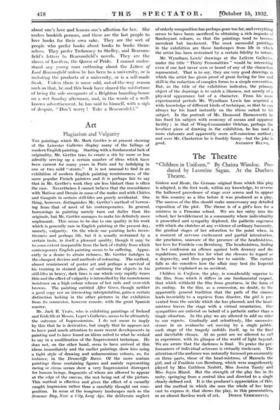The Theatre
"Children in Uniform." By Christa Winsloe. Pro- duced by Leontine Sagan. At the Duchess Theatre.
Gestern and Heute, the German original from which this play is adapted, is the first work, within my knowledge, to reverse the hallowed precedence of stage over screen and to appear in this country as a film before it was produced as a play. The success of the film should make unnecessary any detailed exposition of the plot. The theme is of a girl's love for a mistress in a Prussian school. We see her entry into the school, her bewilderment in a community where individuality is proscribed and sympathy deplored, the pathetic eagerness with which she clutches at any evidence of ordinary humanity, the gradual stages of her adoration to the point when, in a moment of nervous excitement and partial intoxication, she proclaims, unaware of the presence of the headmistress, her love for Fraiikin von Bernburg. The headmistress, finding in her confession an offence against both decency and the regulations, punishes her for what she chooses to regard as a depravity, and thus propels her to suicide. The curtain falls as she considers how the affair may best (to Imperial patrons) be explained as an accident.
Children in Uniform, the play, is considerably superior to the film, from which it differs in one fundamental respect, that which withheld the film from greatness, in the form of its ending. In the film, as a concession, no doubt, to the apparently general tradition that the path of the cinema leads invariably to a reprieve from disaster, the girl is- pre- vented from the suicide which she has planned, and the head- mistress leaves the stage with a virtual recantation. Our sympathies are enlisted on behalf of a pathetic rather than a tragic situation. In the play we are allowed to add no rider to our regrets. Gradually and relentlessly, like successive stones in an avalanche set moving by a single pebble, each stage of the tragedy unfolds itself, up to the final and inevitable climax. At no point are we allowed to call in experience, with its glimpse of the world of light beyond. We are aware that the darkness is final. To praise the per- formances of individual actresses is virtually irrelevant. The attention of the audience was naturally focussed pre-eminently on three parts, those of the head-mistress, of Manuela the girl, and of Fraiilein von Bernburg, which were magnificently played by Miss Cathleen Nesbitt, Miss Jessica Tandy and Miss Joyce Bland. But the strength of the play lies in its unity, springing from a central idea and directed to a single clearly-defined end. It is the producer's appreciation of this, and the method in which she uses the whole of her large cast to express it, that shows the play, in this presentation, as an almost flawless work of art. DEREK VERHOROYLE.


























































 Previous page
Previous page